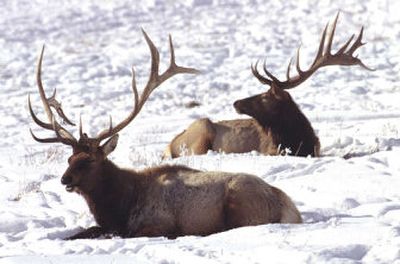Idaho considers hunting permit change

The Idaho Department of Fish and Game is considering changing its permit system to favor hunters who failed to win one in previous hunts.
The department has been surveying hunters who routinely apply for permit-only hunts, asking if they would support the change. One of the alternatives being considered is a system similar to one used by the Nevada Department of Fish and Wildlife, which “squares” the chances for unsuccessful applicants in each successive drawing, giving hunters better odds each year until they draw a tag.
The system doesn’t guarantee that hunters who have missed out in the past would win a tag, said Jim Unsworth, chief of the Wildlife Bureau for the Idaho Department of Fish and Game at Boise. Hunts with long odds – ones where few permits are available – would still be difficult to draw.
“The easier the hunt is to draw the better the system works,” Unsworth said. “If it has really difficult odds nothing works.”
At the November Fish and Game Commission meeting, Brad Compton, state big-game research manager, presented results of initial surveys showing that Idaho hunters were fairly evening split on the Nevada model proposal. He summarized the results as a tendency to favor the idea of a points system but “not a lot of willingness to pay for it.”
The costs of keeping drawing records on Idaho hunters and administering a bonus points system are estimated at about $6 per application, which would be charged in addition to the $6.25 application fee, Compton said.
Hunters surveyed were equally divided on a system in which voluntary bonus points would be given only to those who paid a higher application fee.
Fish and Game Department staffers suggested an alternative that would automatically give unsuccessful applicants two chances in the next drawing for the same species. The plan would affect deer, elk, antelope and moose hunts. Successful applicants would have to wait two years before applying again instead of the current one year, a move that would reduce the pool of applicants. This method would cost the department little and would result in no additional fee, Compton said.
Commissioners asked the department to study these and other options to be presented at the next commission meeting in January.
Other possible options for improving drawing odds include:
“Limiting hunters to one application for a controlled hunt permit each year to reduce the number of applicants for each species. Currently, hunters who put in for either moose, goat or sheep permits can’t enter drawings for deer, elk or antelope permits the same year. But hunters can enter individual drawings for elk, deer and antelope permits in the same year.
“Lengthening the time hunters must wait to apply for another controlled hunt permit after they have successfully drawn one. Hunters who win an elk permit must wait two years before they can apply to win another one. That waiting period could be increased to five years.